|
"André Devillers"
"Le Monde Invisible des Papillons"
"Rennes. 21 cm x 27 cm. 1959. Broché. 32 pages. Rennes Société Economique de Rennes s.d. (1959) - Album broché avec des vignettes 21 cm x 27 cm 32 pages. Texte dessins et images de André Devillers. Bon état ; toutes les vignettes ne sont pas collées" "Bon état"
Referenz des Buchhändlers : 100073904
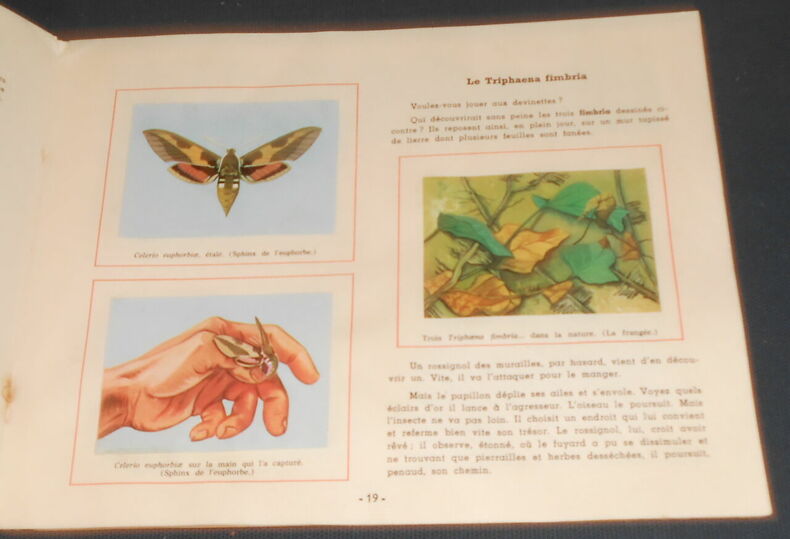
|
|
|
"BENEDEN, PIERRE-JOSEPH. - (H.G. BRONN)
Mémoire sur les vers intestinaux.
Paris, Mallet-Bachelier, 1861. 4to. Contemp. hcloth. Gilt lettering to spine. In: ""Supplément aux Comptes rendus hebdomadaires des séances de l’Académie des sciences"", Tome Deuxieme. (6),376 pp. a. 27 fine engraved plates. A punched stamp to lower margin of title-page. Clean and fine.
Referenz des Buchhändlers : 49474
|
|
|
"BERG, KAJ.
Studies on the Bottom Animals of Esrom Lake.With 17 Plates and 183 Figures in the Text.
København, Munksgaard, 1938. 4to. Privat hldrbd. med rygforgyldning. 255 pp., textillustr. and 17 plates.
Referenz des Buchhändlers : 44625
|
|
|
"BENEDEN, PIERRE-JOSEPH. - (H.G. BRONN)
Mémoire sur les vers intestinaux.
Paris, Mallet-Bachelier, 1861. 4to. Contemp. hcloth. Gilt lettering to spine. In: ""Supplément aux Comptes rendus hebdomadaires des séances de l’Académie des sciences"", Tome Deuxieme. (6),376 pp. a. 27 fine engraved plates. A punched stamp to lower margin of title-page. Clean and fine.
|
|
|
"BERG, KAJ.
Studies on the Bottom Animals of Esrom Lake.With 17 Plates and 183 Figures in the Text.
København, Munksgaard, 1938. 4to. Privat hldrbd. med rygforgyldning. 255 pp., textillustr. and 17 plates.
|
|
|
"BLES, EDWARD J.
The Life-History of Xenopus laevis, Daud. (Witrh four Plates).
Edinburgh, Grant & Son, 1905. Large 4to. Loose and wrappers with tears. Some traces of use. (32) pp. and 4 fine chromolithographed plates. Offprint from ""Transactions of the Royal Society of Edinburgh."" Vol. XLI, Part III, No. 31
Referenz des Buchhändlers : 47774
|
|
|
"BLES, EDWARD J.
The Life-History of Xenopus laevis, Daud. (Witrh four Plates).
Edinburgh, Grant & Son, 1905. Large 4to. Loose and wrappers with tears. Some traces of use. (32) pp. and 4 fine chromolithographed plates. Offprint from ""Transactions of the Royal Society of Edinburgh."" Vol. XLI, Part III, No. 31
|
|
|
"BOMARE, VALMONT de. - OTTO FABRICIUS' EKSEMPLAR.
Den almindelige Natur=Historie i Form af et Dictionnaire. Oversat, forøget og forbedret of H. von Aphelen. 8 Bd.
Kiøbenhavn, C.L. Borup, 1767-70. Indbundet i 8 samtidige helldrbd. Ryg og kapitæler noget slidte. I hvert bind forefindes gl. ejersignaturer med angivelse af sted og tid for erhvervelsen, f.eks. ""Kjøbt 1768 i Kbhvn. O. Fabricius"" og i de senere bind ""Kjøbt 1769 (-1771) i Grønland. O. Fabricius"". Indvendig ganske velbevaret med lidt spredte brunpletter og med en del tilføjelser i marginer af Otto Fabricius, som givervis har anvendt værket ved udarbejdelsen af hans pioneerværk ""Fauna Greoenlandica"", udgivet 1780.
Referenz des Buchhändlers : 52863
|
|
|
"BONNET, (CHARLES). - FIRST SCIENTIFIC DESCRIPTION OF THE TAPEWORM.
Dissertation sur le Ver nommé en Latin Tænia, & en francois Solitaire, où après avoir parlé d'un nouveau secret pour l'expulser des intestins dans lesquels il est logé, qui a eu d'heureux succès, l'on donne quelques observations sur cet Insecte. P...
Paris, L'Imprimerie Royale, 1750. 4to. Extract from ""Mémoires de Mathematique et de Physique, Présentés à l'Academie des Sciences par divers Savans"", Tome I. Pp. 478-529 pp. and 2 engraved plats. With titlepage to Volume I. A small wormhole to inner margin.
Referenz des Buchhändlers : 45045
|
|
|
"BOAS, J.E.V.
Studier over Decapodernes Slægtskabsforhold.
København, 1880. 4to. Uden omslag som udkommet i ""Videnskabernes Selskabs Skrifter"", pp. 23-208 samt 7 litograferede plancher med talrige figurer.
Referenz des Buchhändlers : 39116
|
|
|
"BOAS, J.E.V.
Studier over Decapodernes Slægtskabsforhold.
København, 1880. 4to. Uden omslag som udkommet i ""Videnskabernes Selskabs Skrifter"", pp. 23-208 samt 7 litograferede plancher med talrige figurer.
|
|
|
"BOMARE, VALMONT de. - OTTO FABRICIUS' EKSEMPLAR.
Den almindelige Natur=Historie i Form af et Dictionnaire. Oversat, forøget og forbedret of H. von Aphelen. 8 Bd.
Kiøbenhavn, C.L. Borup, 1767-70. Indbundet i 8 samtidige helldrbd. Ryg og kapitæler noget slidte. I hvert bind forefindes gl. ejersignaturer med angivelse af sted og tid for erhvervelsen, f.eks. ""Kjøbt 1768 i Kbhvn. O. Fabricius"" og i de senere bind ""Kjøbt 1769 (-1771) i Grønland. O. Fabricius"". Indvendig ganske velbevaret med lidt spredte brunpletter og med en del tilføjelser i marginer af Otto Fabricius, som givervis har anvendt værket ved udarbejdelsen af hans pioneerværk ""Fauna Greoenlandica"", udgivet 1780.
|
|
|
"BONNET, (CHARLES). - FIRST SCIENTIFIC DESCRIPTION OF THE TAPEWORM.
Dissertation sur le Ver nommé en Latin Tænia, & en francois Solitaire, où après avoir parlé d'un nouveau secret pour l'expulser des intestins dans lesquels il est logé, qui a eu d'heureux succès, l'on donne quelques observations sur cet Insecte. P...
Paris, L'Imprimerie Royale, 1750. 4to. Extract from ""Mémoires de Mathematique et de Physique, Présentés à l'Academie des Sciences par divers Savans"", Tome I. Pp. 478-529 pp. and 2 engraved plats. With titlepage to Volume I. A small wormhole to inner margin.
|
|
|
"BREMSER, (JOHANN GOTTFRIED).
Über Lebende Würmer im lebender Menschen. Ein Buch für ausübende Aerzte. Mit nach der Natur gezeichneten Abbildungen auf vier Tafeln. Nebst einem Anhange.
Wien, C. Schauenburg et Comp., 1819. 4to. Cont. hcalf. Gilt back. Red gilt titlelabel in leather. Top of spine a little worn. Otherwise fine. Titlepage with large engraved illustration (Pseudo-Helminthen). XII,284 pp. + (4) pp. of ""Erklärung zu Tafeln"", 4 engraved and coloured plates (colourprinted - handcoloured ??).
Referenz des Buchhändlers : 28353
|
|
|
"BREMSER, (JOHANN GOTTFRIED).
Über Lebende Würmer im lebender Menschen. Ein Buch für ausübende Aerzte. Mit nach der Natur gezeichneten Abbildungen auf vier Tafeln. Nebst einem Anhange.
Wien, C. Schauenburg et Comp., 1819. 4to. Cont. hcalf. Gilt back. Red gilt titlelabel in leather. Top of spine a little worn. Otherwise fine. Titlepage with large engraved illustration (Pseudo-Helminthen). XII,284 pp. + (4) pp. of ""Erklärung zu Tafeln"", 4 engraved and coloured plates (colourprinted - handcoloured ??).
|
|
|
"BRIDGE, T.W. a. A.C. HADDON.
Contributions to the Anatomy of Fishes. II. The Air-bladder and Weberian Ossicles in the Siluroid Fishes.
(London, Harrison and Sons, 1894). 4to. No wrappers as extracted from ""Philosophical Transactions"", 1893, Vol. 184 B. Pp. 65-333 and 9 fine photolithographed plates with many figs.
|
|
|
"BUDDE-LUND, G.
A Revision of ""Crustacea Isopoda terrestria"" with Additions and Illustrations. 3 Parts (in 2). (1. Eubelum. 2. Spherilloninæ. 3. Armadillo). 2 vols.
Copenhagen, 1899-1904. 2 cont. hcloth. 31,144 pp. and 10 fine engraved plates with many figs.
Referenz des Buchhändlers : 25012
|
|
|
"BUDDE-LUND, G.
A Revision of ""Crustacea Isopoda terrestria"" with Additions and Illustrations. 3 Parts (in 2). (1. Eubelum. 2. Spherilloninæ. 3. Armadillo). 2 vols.
Copenhagen, 1899-1904. 2 cont. hcloth. 31,144 pp. and 10 fine engraved plates with many figs.
|
|
|
"BUFFON, (G.L.L. DE).
Histoire naturelle , generale et particuliere, avec la description du cabinet du Roi. Tome Neuvième.
Paris, Imprimerie Royale, 1761. 4to. Contemporary full mottled calf, spine and boards worn. (4), 376 pp. With engraved vignette on titlepage and 41 full-page engraved plates, many folding. Plate 16 torn.
|
|
|
"Carlos Verlinden"
"Notes sur l'Histoire Naturelle et La Chasse du Cerf"
"1953. Liège Imprimerie Bénard s.d. (1953) - Broché 18 cm x 24 cm 126 pages photos peintures et ills in et hors-texte noir & blanc - Texte de Carlos Verlinden - Corrections manuscrites de l'ancien propriétaire sur les trois dernières pages sinon bon état"
Referenz des Buchhändlers : 18780

|
|
|
"CARPENTER, WILLIAM B.
Researches on the Structure, Physiology, and Development of Antedon (Comatula, Lamk.) rosaceus - Part I. Received June 15, - Read June 15, 1865.
(London, Taylor and Francis, 1866). 4to. No wrappers as extracted from ""Philosophical Transactions"", Vol. 156 - Part II, pp. 671-756 a. 13 fine lithographed plates. Clean and fine.
Referenz des Buchhändlers : 42761
|
|
|
"CARLISLE, ANTHONY. - A MONSTROUS LAMB DESCRIBED.
Account of a monstrous Lamb. In a Letter to Sir Joseph Banks. Read January 29, 1801.
(London, W. Bulmer and Co., 1801). 4to. No wrappers as extracted from ""Philosophical Transactions"" 1801 - Part I. Pp. 139-144 and 1 engraved plate.
|
|
|
"CARPENTER, WILLIAM B.
Researches on the Structure, Physiology, and Development of Antedon (Comatula, Lamk.) rosaceus - Part I. Received June 15, - Read June 15, 1865.
(London, Taylor and Francis, 1866). 4to. No wrappers as extracted from ""Philosophical Transactions"", Vol. 156 - Part II, pp. 671-756 a. 13 fine lithographed plates. Clean and fine.
|
|
|
"Comte Aimery de Comminges"
"A travers l'Allemagne hippique"
"1911. Paris Librairie Plon 1911 2ème ed. - Broché cm x cm VIII+ 206 pages ills hors-texte - Texte du Comte Aimery de Comminges signature du Comte de Toulouse-Lautrec - Ex. à relier"
Referenz des Buchhändlers : 16241

|
|
|
"CUVIER, G.
Tableau élémentaire de l'Histoire Naturelle des Animaux.
Paris, Baudouin, An 6 (1798). 8vo. Nice cont. full mottled calf. Richly gilt back. Light wear to lower part of back and a small hole in leather at lower hinge. Red leather titlelabel. XVI,710 pp. and 14 engraved plates with many figs. A large clean copy.
Referenz des Buchhändlers : 29881
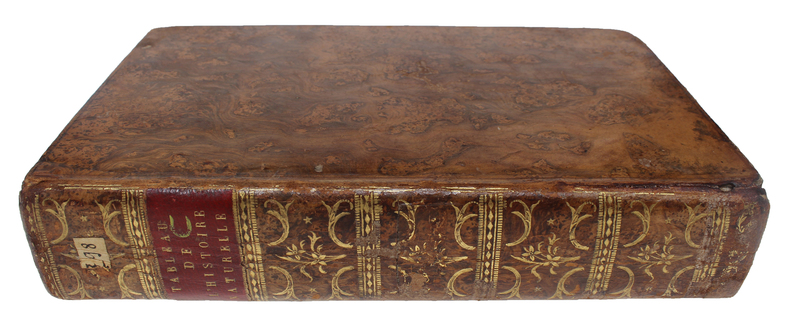
|
|
|
"CUVIER, GEORGES L.C.F.
Tableau élémentaire de l'Histoire Naturelle des Animaux.
Paris, Baudouin, An 6 (1798). 8vo. Contemp. hcalf, richly gilt back. Titlelabel with gilt lettering. Corners a bit bumped, otherwise fine. XVI,710 pp. and 14 engraved plates with many figs. A few scattered brownspots. Printed on good paper.
Referenz des Buchhändlers : 38049
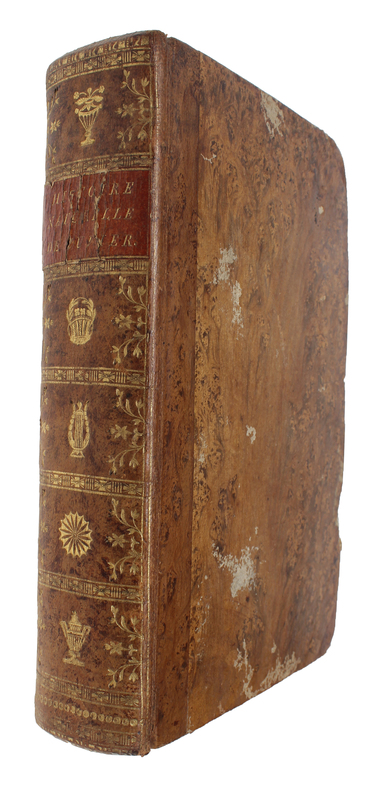
|
|
|
"CUVIER, G.
Tableau élémentaire de l'Histoire Naturelle des Animaux.
Paris, Baudouin, An 6 (1798). 8vo. Nice cont. full mottled calf. Richly gilt back. Light wear to lower part of back and a small hole in leather at lower hinge. Red leather titlelabel. XVI,710 pp. and 14 engraved plates with many figs. A large clean copy.
|
|
|
"CUVIER, GEORGES L.C.F.
Tableau élémentaire de l'Histoire Naturelle des Animaux.
Paris, Baudouin, An 6 (1798). 8vo. Contemp. hcalf, richly gilt back. Titlelabel with gilt lettering. Corners a bit bumped, otherwise fine. XVI,710 pp. and 14 engraved plates with many figs. A few scattered brownspots. Printed on good paper.
|
|
|
"DARWIN, CHARLES.
A fajok eredete a természeti kiválás útján vagyis az elonyös válfajok fenmaradása a létérti küzdelemben. [Hungarian - i.e. On the Origin of Species... Translated by Dapsy László and revised by Margó Tivadar]. 2 vols. - [THE FIRST HUNGARIAN ""ORIGIN OF SPECIES""]
Budapest, Kiadja a Természettudományi Társulat [Academy of Sciences], 1873 & 1874. 8vo. In two contemporary embossed full cloth bindings with gilt letter- and numbering to spine. Bindings with light wear, primarily affecting hindges. Previous owner's stamp to half title and title page in both volumes. Light occassional brownspotting, primarily affecting first and last leaves. An overall nice copy. XVI, (2), 303, (1)"" VII, (1), 361, (1) pp. + 1 leaf of Advertisement + 2 plates (A frontiespiece of Darwin and one listing the evolution of the different generations).
Referenz des Buchhändlers : 60158
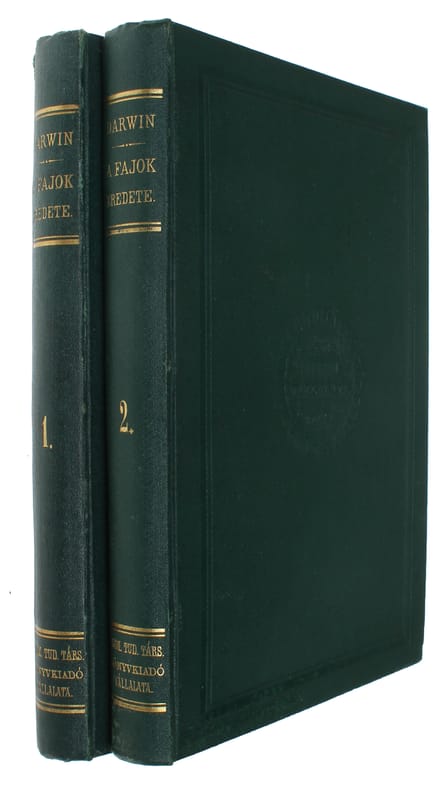
|
|
|
"DARWIN, C. R.
A new view of Darwinism.
London and New York, Macmillan and Co., 1871. Royal8vo. In publisher's original red embossed cloth. In ""Nature. A Weekly Illustrated Journal of Science"", Vol. 4, April-October 1871. Stamp to title-page and p. 1 and ex-libris pasted on to pasted down front end-paper. Binding with wear and light soiling, spine partly detached with a 7 cm long tear to rear hindge. Internally fine and clean. Darwin's paper: Pp.180-181. [Entire volume: XII, 520 pp].
Referenz des Buchhändlers : 60108
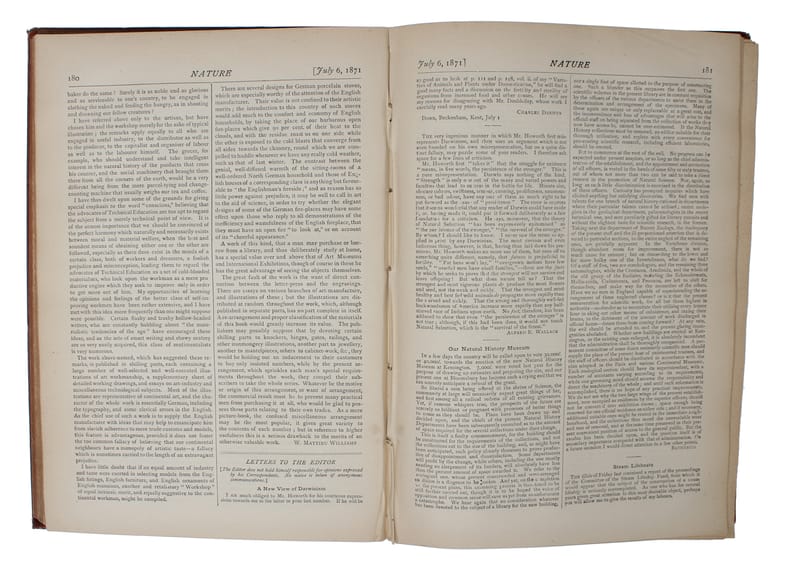
|
|
|
"DARWIN, CHARLES.
Briefe von Darwin. Mit Erinnerungen und Erlaeuterungen. (i.e. English ""Letters on Geology""). - [RARE FIRST TRANSLATION OF DARWIN'S FIRST PUBLISHED WORK]
Berlin, Gebrüder Paetel, 1891. Large8vo. In a nice contemporary half calf binding with 5 raised bands and gilt lettering to spine. In ""Deutsche Rundschau"", Band 67, 1891. Green leather title-label and red leather tome-label to spine, Small paper label pasted on to top left corner of front board. Two stamps to first leaf and one stamp to P. 476. Light wear to extremities, internally very fine and clean. Pp. 357-390. [Entire volume: IV, 480 pp.]
Referenz des Buchhändlers : 53191
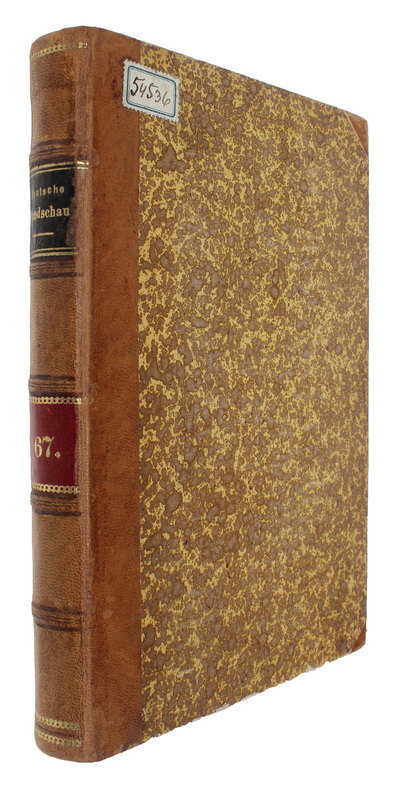
|
|
|
"DARWIN, CH. (CHARLES).
De L'Origine des Espèces ou des Lois du Progrès chez les Étres organisés par Ch. Darwin. Traduit en francais sur le troisieme Édition avec l'autorisation de l'Auteur par Mlle Clémence-Auguste Royer. Avec une Preface et des Notes du Traducteur. - [FIRST FRENCH EDITION OF THE ""ORIGIN""]
Paris, Guillaumin et Cie, Victor Masson et Fils, 1862. 8vo. Bound uncut and with the original printed front wrapper (expertly restored) in a very fine later half morocco binding with four raised bands and gilt title to spine. Very light minor brownspotting to a few pages. An exceptionally nice, clean, and attractive copy. LXIV (incl. half-title), I-XXIII + (24-) 712. pp. and 1 folded plate (between pp.160 a. 161). Fully complete.
Referenz des Buchhändlers : 50871
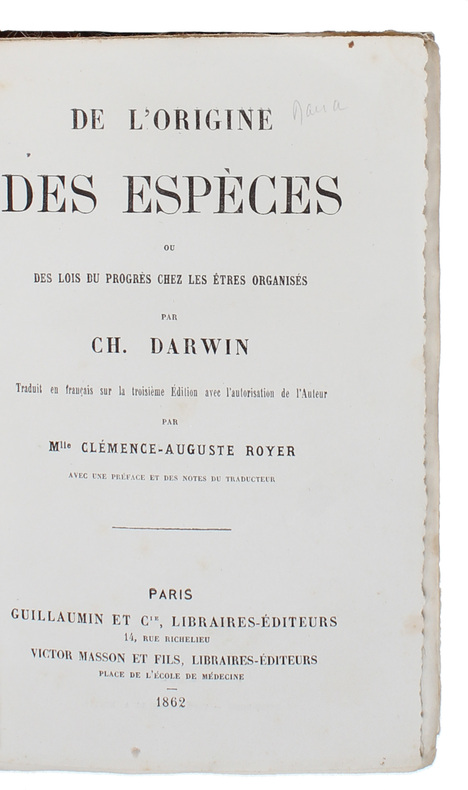
|
|
|
"DARWIN, CH. (CHARLES).
De L'Origine des Espèces ou des Lois du Progrès chez les Étres organisés par Ch. Darwin. Traduit en francais sur le troisieme Édition avec l'autorisation de l'Auteur par Mlle Clémence-Auguste Royer. Avec une Preface et des Notes du Traducteur. - [FIRST FRENCH EDITION OF THE ""ORIGIN OF SPECIES""]
Paris, Guillaumin et Cie, Victor Masson et Fils, 1862. 8vo. In contemporary half calf with gilt title to spine. Very light minor brownspotting to a few pages. Previous owner's name to half title. A fine copy. LXIV (incl. half-title), I-XXIII + (24-) 712. pp. and 1 folded plate (between pp.160 a. 161). Fully complete.
Referenz des Buchhändlers : 52388
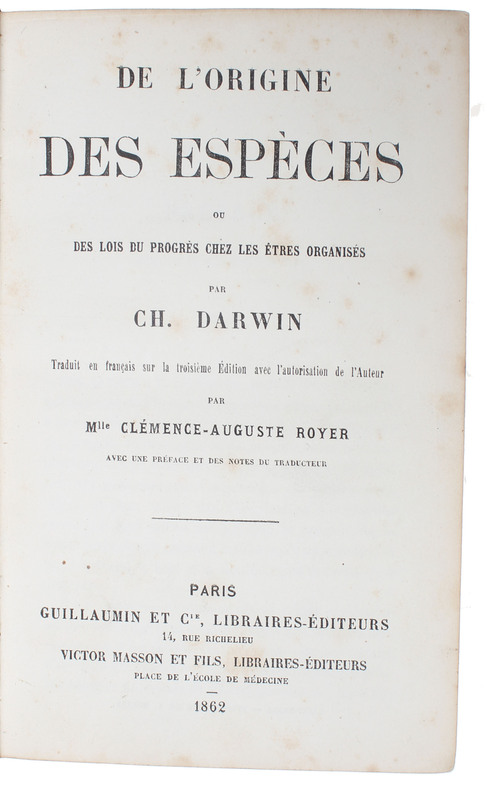
|
|
|
"DARWIN, CH. (CHARLES).
De L'Origine des Espèces ou des Lois du Progrès chez les Étres organisés par Ch. Darwin. Traduit en francais sur le troisieme Édition avec l'autorisation de l'Auteur par Mlle Clémence-Auguste Royer. Avec une Preface et des Notes du Traducteur. - [FIRST FRENCH EDITION OF THE ""ORIGIN""]
Paris, Guillaumin et Cie, Victor Masson et Fils, 1862. 8vo. Bound partly uncut with the original wrappers in a very nice later full calf pastiche binding with four raised band and richly gilt spine. Gilt boarders to boards. Small repair to upper right corner of title-page, not affecting text. An exceptionally fine and clean copy. LXIV (incl. half-title), I-XXIII + (24-) 712. pp. and 1 folded plate (between pp.160 a. 161).
Referenz des Buchhändlers : 55642
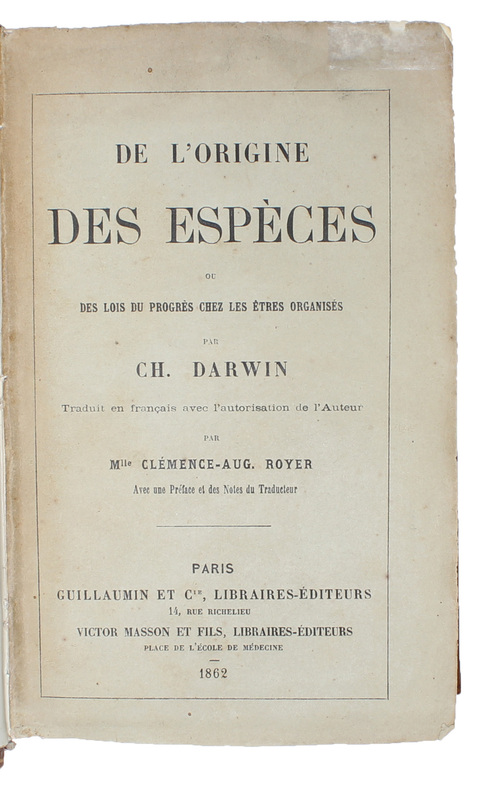
|
|
|
"DARWIN, CARLOS.
Diario del Viaje de un Naturalista Alrededor del Mundo. 2 vols. - [FIRST COMPLETE SPANISH TRANSLATION OF DARWIN'S ""JOURNAL OF RESEARCHES""]
Madrid, Calpe, (1921 & 1922) 8vo. Bound in one half calf binding with four raised bands. Spine with wear, otherwise a fine copy. X, (6), 361, VIII, 359, (3) pp. + 1 folded map.
Referenz des Buchhändlers : 53616
|
|
|
"DARWIN, CHARLES.
Het Uitdrukken der Gemoedsaandoeningen bij den Mensch en de Dieren. [i.e.: ""The Expression of the Emotions in Man""]. - [FIRST DUTCH TRANSLATION OF DARWIN'S ""THE EXPRESSION OF THE EMOTIONS IN MAN""]
The Hague, Joh. Ykema, 1873. 8vo. In the original publisher's embossed full red cloth with gilt lettering to front board and spine. Previous owner's name to front end-paper and traces after a stamp to lower part of title-page. Spine with a bit of wear, otherwise a fine and clean copy. IX, (1), 435 pp.
Referenz des Buchhändlers : 51711
|
|
|
"DARWIN, CHARLES.
La Descendance de l'Homme et la Sélection Sexuelle. [i.e. English: ""Descent of Man"", Translated by J. J. Moulinié ]. 2 vols. - [FIRST FRENCH TRANSLATION OF DARWIN'S 'DESCENT OF MAN']
Paris, C. Reinwald et Cie, 1872-1873. 8vo. 2 volumes uncut in publisher's original green full cloth with gilt lettering and ornamentation to spines and embossed front and back boards. A stamp to title-pages and very light wear to extremities, internally very fine, clean and fresh. XV, (1), 452, 24 [advertisements] pp."" (8), 494, (2) pp.
Referenz des Buchhändlers : 54612
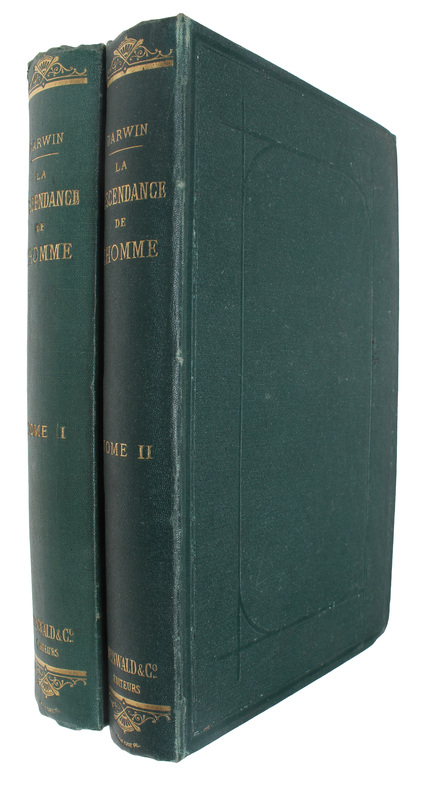
|
|
|
"DARWIN, CHARLES.
Menniskans Härledning och Könsurvalet. [English: ""The Descent of Man""). 2 vols. - [FIRST SWEDISH TRANSLATION OF ""THE DESCENT OF MAN""]
Stockholm, Albert Bonniers, 1872. 8vo. 2 volumes in one (as issued) contemporary half calf binding with gilt lettering to spine. A fine and clean copy. (Frontiespiece), (1), 314, (2) pp."" (4), XV, (1), 294, (6), 39 pp.
Referenz des Buchhändlers : 52355
|
|
|
"DARWIN, CHARLES.
Naturwissenschaftliche Reisen nach den Inseln des grünen Vorgebirges, Sudamerika, dem Feuerlande, den Faltland-Inseln, Chiloe-Inseln, Galapagos-Inseln, Otaheiti, Neuholland, Neuseeland, Ban Diemen's Land, Keeling-Inseln, Mauritius, St. Helena, den Vz... - [FIRST TRANSLATION OF ANY OF DARWIN'S WORK]
Brunswick, F. Vieweg und Sohn, 1844. 8vo. 2 volumes bound in one contemporary half calf binding with gilt lettering to spine. Previous owner's stamp to front free end-paper. Light brownspotting throughout, especially to first and last leaves. XVI, 319, VIII, 301, (3) pp. + 1 folded map.
Referenz des Buchhändlers : 54590
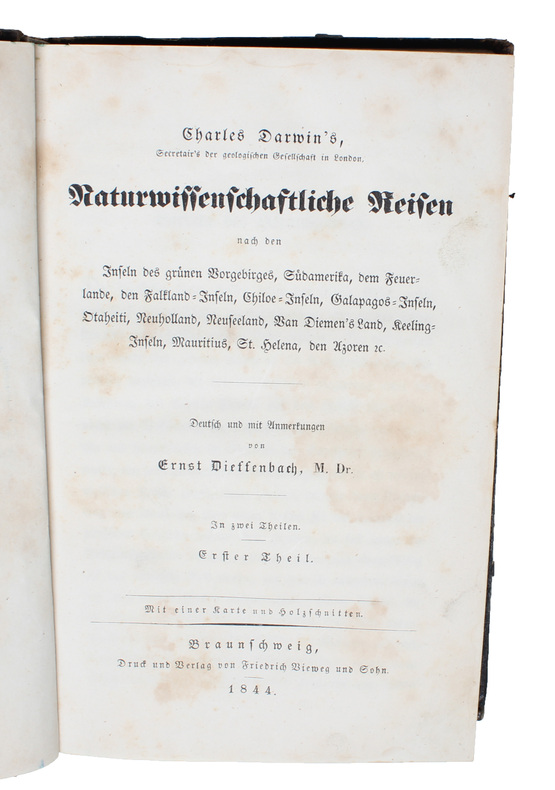
|
|
|
"DARWIN, CHARLES.
O Proischozhdenii Vodov... [Russian: On the Origin of Species]. Perevel c anglijskago [translated from English by] S.A. Rachinsky. - [""THE MOST IMPORTANT BIOLOGICAL BOOK EVER WRITTEN"" (FREEMAN)]
S.-Peterburg, 1864. 8vo. Bound in a beautiful half calf recent pastiche-binding with marbled papers over boards and elegant gilding to spine. End-papers renewed. Stamp to half-title, title-page and first leaf of text. First leaves evenly browned and dampstain to outer margin affecting last 50 ff. A few occassional brownspots throughout. XIV, 399, (1) pp. + 1 plate with genealogical tree (between pp. 92/93).
Referenz des Buchhändlers : 60791
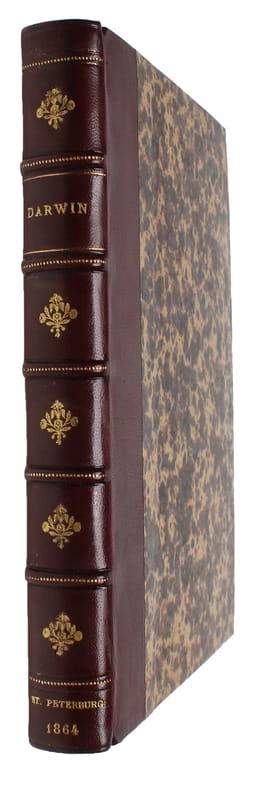
|
|
|
"DARWIN, CHARLES.
O vzniku druhu prirozeným výberem cili Zachováváním vhodných odrud v boji o zivot. [Czech - i.e. On the Origin of Species... Translated by Fr. Klapálek]. - [FIRST CZECH TRANSLATION OF DARWIN'S ""ORIGIN OF SPECIES""]
Praze [Prague], Nákladem Autorovým, 1914. 8vo. In the original red binding with black lettering to spine and front board. Light wear to extremities, inner fronthinge pleit, Internally nice and clean. 389, (1) pp. + 1 folded plate.
Referenz des Buchhändlers : 61622

|
|
|
"DARWIN, CHARLES. - FIRST DANISH EDITION OF ""THE ORIGIN OF SPECIES"".
Om Arternes Oprindelse ved Kvalitetsvalg eller ved de heldigst stillede Formers Sejr i Kampen for Tilværelsen. Efter Originalens femte Udgave oversat af J.P. Jacobsen.
Kjøbenhavn, Gyldendalske Boghandel (F. Hegel), 1872. Contemp. hcalf. Spine gilt and with gilt lettering. Spine slightly rubbed. Corners a bit bumped. (10),XIII,605,(1) pp. and 1 folded plate. A few faint brownspots to the first leaves.
Referenz des Buchhändlers : 47264
|
|
|
"DARWIN, CHARLES.
Originea Speciilor, prin selectie naturala sau pastrarea raselor favorizate in lupta pentru existenta. (i.e. Romanian ""Origin of Species""). - [FIRST COMPLETE ROMANIAN TRANSLATION OF DARWIN'S ""ORIGIN OF SPECIES""]
(Bucharest), National Academy, 1957. Folio. With the original printed wrappers in publisher's full cloth with gilt lettering to spine and gilt ornamentation to spine forming 6 compartments. A fine copy. (2), LXXXIV, 398, (2) pp. [plate with genealogical tree included in the pagination].
Referenz des Buchhändlers : 57927
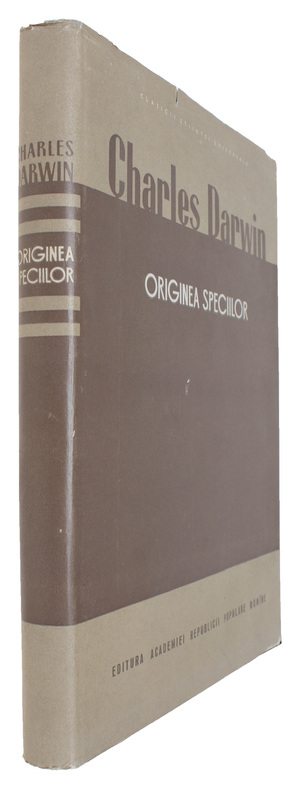
|
|
|
"DARWIN, C. R.
Pangenesis. - [DARWIN'S FERENSE OF HIS PANGENESIS-THEORY.]
London and New York, Macmillan and Co., 1871. Royal8vo. In publisher's original red embossed cloth. In ""Nature. A Weekly Illustrated Journal of Science"", Vol. 3, November 1870 - April 1871. Stamp to title-page and ex-libris pasted on to pasted down front end-paper. Binding with considerable wear"" spine partly disintegrated and front board bended vertically, but bookblock firmly attached. Internally fine and clean. Darwin's paper: Pp. 502-503. [Entire volume: XII, 520 pp].
Referenz des Buchhändlers : 60107
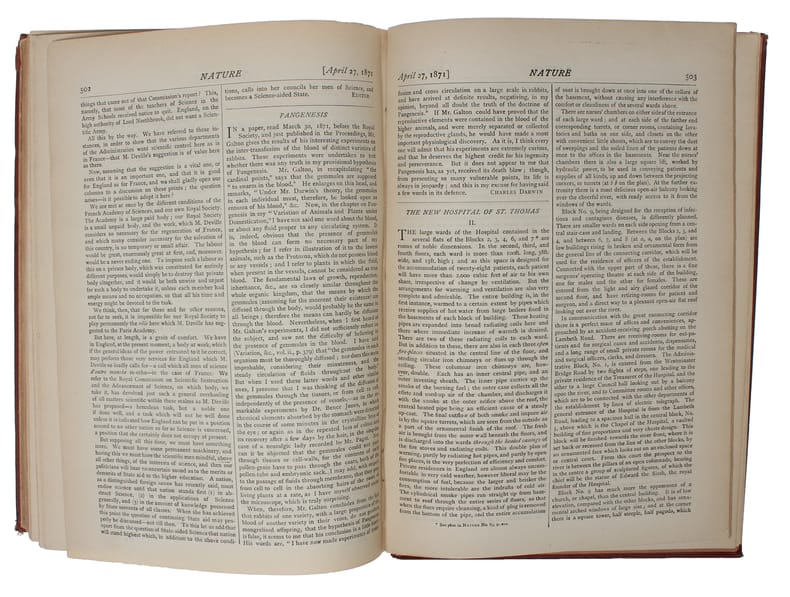
|
|
|
"DARWIN, CHARLES.
Perception in the Lower Animals.
London, 1873. Small folio. Extracted, with traces from the sewn cords, in the original printed wrappers. In ""Nature"", No. 176, Vol. 7, March 13. Entire issue offered. Issue split in two, otherwise fine and clean. Housed in a portfolio with white paper title-label to front board. Darwin's notice: P. 360. [Entire issue: Pp. (1), lxxxvi-xcii, 357-376].
Referenz des Buchhändlers : 60131
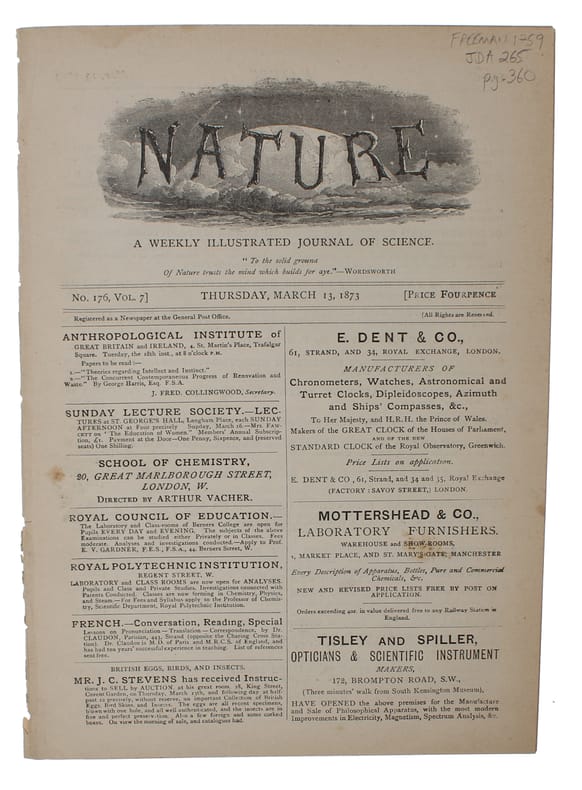
|
|
|
"DARWIN, CHARLES.
Proiskhozhdenie chelovieska i polovoi podbor [i.e. English ""Descent of Man""]. - [FIRST TRANSLATION OF DARWIN'S 'DESCENT OF MAN' INTO ANY LANGUAGE]
S.-Peterburg, Izdanie redaktsii zhurnala ""Znanie, 1871. 8vo. In recent half calf with four rasied bands and gilt lettering to spine. Soiling and damp stain to title-page. Light brownspotting throughout. (2), VII, (5), 439, (7) pp.
Referenz des Buchhändlers : 56375
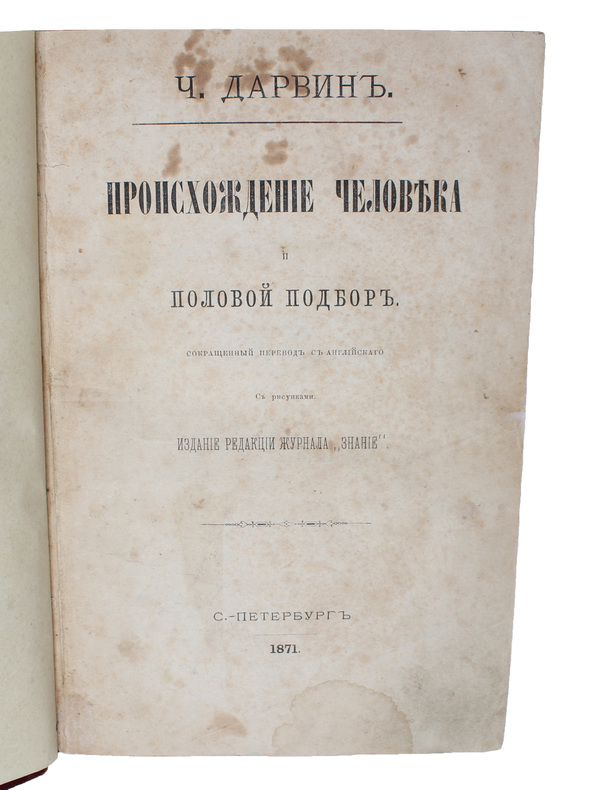
|
|
|
"DARWIN, CHARLES.
Rejse om Jorden. Populære Skildringer. Efter den engelske Originals nyeste, af Forfatteren gjennemsete Udgave. Paa Dansk ved Emil Chr. Hansen og Alfred Jørgensen. Med Illustrationer i Tontryk, et Kort i Farvetryk samt Forfatterens Portræt og Biografi.
Kjøbenhavn, Brødrene Salmonsen, 1876. Samtidigt hldrbd. med rygforgyldning. Lttere brugsspor ved kanter. XXIII,570,(1) pp., portræt, et foldekort, 7 tonede litografier. Indvendigt rent frisk eksemplar.
Referenz des Buchhändlers : 38650
|
|
|
"DARWIN, CARLO [CHARLES].
Sulla struttura e distribuzione dei banchi di corallo e delle isole madreporiche. [i.e. English ""The structure and distribution of coral reefs""].
Torino, Unione Tipografico-Editrice, 1888. 8vo. In comtenporary half vellum with embossed title to spine. First quire partly detached. Occassional light brownspotting throughout. (2), 210, (4) pp. + 3 floded plates and 1 frontiespiece. This
Referenz des Buchhändlers : 53223
|
|
|
"DARWIN, CHARLES.
Tesakneri tsagumê. [Armenian - i.e. ""Origin of Species"". Translated by S. Sargysan]. - [EXCEEDINGLY RARE FIRST ARMENIAN TRANSLATION OF 'ORIGIN OF SPECIES']
Erevan, Armenia, Gosizdat, 1936. 8vo. In publisher's original full cloth with title in silver lettering to spine and front board. A picture of Darwin embossed to front board. Extremities with wear and hindges weak. Spine miscoloured and remains of paperlabel to upper part of spine. First quire loose. Internally fine and clean. (2), 765 pp. + frontiespiece and plate with genealogical tree.
Referenz des Buchhändlers : 54837
|
|
|
"DARVIN, CH´ARLZ. [CHARLES DARWIN]
Tesakneri tsagumê. t´argmanut´yune anglerenits´, rusereni ev neratsakan hodvatse K.A. Timiryazevi. [Armenian - i.e. ""Origin of Species"". Translated by K. A. Timiryazev]. - [RARE SECOND ARMENIAN TRANSLATION OF 'ORIGIN OF SPECIES']
Erevan, Hayastani Petakan Hratarakch'ut'yun, 1963. Royal8vo. In publisher's full green cloth with gilt lettering to spine and front board. Light wear to extremities, primarily affecting spine. Inner font hinge split, otherwise a fine and clean copy. 591, (1) pp. + 2 plates.
Referenz des Buchhändlers : 61618

|
|